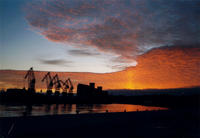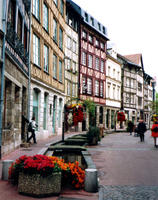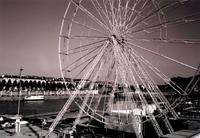

The train edged out of Rouen, past two industrial workshops hewn out of the rock, 'Lampisterie' and 'Exploitation'. A taxi primed at Dieppe, got me to the boat just in time for a weekend back in Brighton.
Hoverspeed, cowboys of the Southern Seas, have taken their service concept from the fairground 'House of Horror'. You settle into a corner of a little compartment that sets off sedately, before crashing through the harbour gates into the wild beyond. Eyelids close down on darkness, a fragile veil of protection torn through by searing shocks. A gust of vomit scorches the nostrils followed by a hot flannel in the face, courtesy of a grinning mannequin in a pagegirl suit. A heffer with elephantitis tumbles into your lap, one of the procession of grotesques compelled to circuit the sloping walkways, dayglo shell suits, sawn off leggings, socks on sandaled feet. White noise spirals from a wall of one arm bandits, industrial hand driers blast through the toilet door, arid laughter, conversation too inane to be true and a tide of infant rebellion rising to a spasm of febrile lungs. Just when you are conjuring visions of a celestial Eurostar capsule, the hovercraft breaks into the clear daylight of Newhaven harbour, lines of seagulls waving from the cliffs, the Fellini cast slipping away, never to emerge again.

A Connex pony express canters round the corner, falls lame at Lewes but soldiers bravely on to Brighton, a town more electrically charged than ever. Fat Boy Slim has just performed on the beach to a cast of thousands, and every vacant tarot card den is being turned into cocktail, sushi madness. The only person in town with little to sell is Carol, the wind having kept the trawler at bay, so I pulled out a sun lounger beside her barrow and traded news through my floppy blue hat. That night ate excellent fish at 'The Regency' opposite the West Pier, then up Dyke road to visit Marge, fifty years married to Charlie, the oldest waiter in town. A Barnados boy apprenticed to the Eastbourne Grand, he served at Dunkirk, Burma and the Normandy Landings, before forty years working the smartest hotels in town. Well into his seventies he still held court in burgundy jacket and bow tie, flirtatious eye for the ladies and a brush off for the gents. Half deaf, dodgy ticker, unsteady on his pins, he would transform an order for Spotted Dick into a script from Carry on Crumble. Last November he passed away and Marge is left with her dolls and the memories she recounted over a bottle of Bergerac wine.
Refuelled with human warmth, I returned on the early boat which stalled mid-Channel, struggling into Dieppe on half an engine and a hand drier. Made straight for the kitchen and the whisking of one hundred chocolate genoese, preparation for the most celebrated wedding in northern France. Vikki and Steve are friends to savour, and the posting of the Banns lit paths from Ireland, Scotland, the Lebanon and Spain, a gathering of the clan of emigré Rouennais. Civic nuptials at l'Hôtel de Ville, lunch at Le Moulin de Mule, then onto Saint Maclou for the fully fledged ceremonial. That evening the whole troupe de-camped to a great barn near Auffay, a feast of foie gras, magret de canard, a stunning Calvados sorbet and champagne cascading through crystal glass.

The next day I returned to Auffay, canoes for hire and two metal drummer boys beating time on the church wall. Faded lettering outside the café revealed something of a grander past, 'Hostellerie de la Vallée de la Scie', spinning carriage wheels scrunching to the door, platters of game, cinnamon apples and foaming goblets of cider. Behind the café, a lovely park cut through with running water, and the tiniest toilet perched like a sentry box above a stream. A few miles away, the Château le Bosmelet has fallen on hard times, the family silver being auctioned off in a marquis on the lawn, attentive faces, boater hats and crumpled summer jackets. Took a turn around the grounds. A path telescoping through trees to the silhouette of a boy on a bike, the obligatory modern sculpture sprouting from the grass, and the roof of the gatehouse, a rolling patchwork of lichens and slate.
The succeeding week filled with insufferable heat, days of languid torpor, nights too dense to sleep. An orange half moon sat serenely in the sky, while a storm in the south flashed and rumbled like shellfire. On Sunday made a bee line for Pourville beach, simmering shallows, eddying sand and the embrace of a still sea. A few lazy strokes towards a lost horizon, then floating back to crumbling cliffs scorched terracotta from the kiln. This is where Camus' Meursault killed the arab, beneath a blinding sky and a relentless sun. Somehow made it over the hill to Dieppe, and sat in the shadow of the Rue Haut Pas outside the Café de l'Union. One of the tenements has a tree filling the walls, another has crumbled into the street. The café clientele has known better times, but Madame has undergone an upgrading. Robe filled with poise, trim auburn coiffure, and Dame Edna glasses exchanged for something softer. Her assistant remains unreconstructed Marge, wan face, goosey waddle and an apron born in the Crimean war.
Returned on the train opposite an old man sucking a boiled sweet with the look of a baffled baby. Cloud cover settled over the city, the lid upon the cauldron, and I ate outside L'Orangerie in the strange nocturnal heat. Langoustine quenelles, meaty mussels and mascapone ice cream melting into roasted figginess. All for a price which in England would get you tired pizza and tiramasu. How does a restaurant make a living over here? I do not know. The month of June every lunchtime was busy, yet I barely broke even. One week after launching the business, the African who owns the Baobab Tree looked me long in the eye and spoke in measured tones. "You must never. Employ. Anybody." The social charges will kill you. A month later, Philippe from the Bistrot Parisien searched for words that could express the dead hand of the French state. 'On vous broye', escaped through clenched teeth. 'They crush you'. Dip a toe into the black economy and you are dead. The thought police descend on a fishing fleet at 3 o'clock in the morning, a factory will be surrounded, exits locked, while they search for 'illegal' labour. If the millions of British shopkeepers took a look this side of the Channel, they would tap dance all the way home.

'L'Orangerie' was the town hall in eighteenth century Rouen, a cavern of criss-cross arches behind La Maison Pierre Corneille. Corneilles' country house has been turned into a market garden of his time. Follow the Seine to Croisset, cross on the ferry to Petit Couronne, and there it stands, wood and slate walls among ornamental borders. Lines of battavia, frisée and escarole, Milanese cabbage, medicinal plants and all the kitchen herbs we use today. Saffron comes as an exotic surprise, as does parsnip, no longer valued in these parts. They don't know what they're missing.
A history of local food, 'À la fortune du pot', has been assembled at Pont l'Evêque. Vineyards were common in the Middle Ages, Henry IV musing how such beautiful grapes could make so terrible a wine. Travellers to the East brought back artichokes, cauliflower and rhubarb. On 28th August 1563, a banquet was held in honour of Catherine de Medici, a significant event as her marriage to the king introduced Italian cooking to France. Flax has long been cultivated around the magical name of Doudeville. Originally bound with straw and clay to insulate the farmhouse, it has recently evolved into a healthfood; flax bread and flax pâté, full of the oils that make for a happy heart. All very remarkable in this land dripping with fat. Beurre d'Isigny is considered the best butter in the world and meltingly ripe Pont l'Evêque cheese is a wicked cholesterol treat. A dozen charcuterie windows hang with long fat sausage, one displaying the Lonsdale belt, 'Champion du monde des Tripes'.
The high street at Pont l'Evêque has grown organically out of the land, cows grazing to the left, a saddle shop to the right. The church has been seamlessly rebuilt, windows bright swirls of colour, unblemished by pious saints. The outer walls read like a roll call of modern warfare. Perot, Seventh Hussars, killed at Wagram, 1809. Tesson, lost on the retreat from Moscow. The terrible culling of the first world war and the 'victimes civiles' of the second. A park has been dedicated to Jean Bureau, mayor from 1939-1944 and 1953-1977. What caused his post-war fall from grace and why did they forgive him? Pedaled uphill to Beaumont en Auge, a living replica of the past offering a sense of identity. The priory founded by Bertrand, Baron et Vicomte de Roncheville, has a garden overlooking Calvados country, Caen, Bayeux, Mont St. Michel, signposts for a future tale.
Extract from the book, 'A Mule in Rouen-a discovery of Upper Normandy'
by Rob Silverstone
ISBN 1843861631